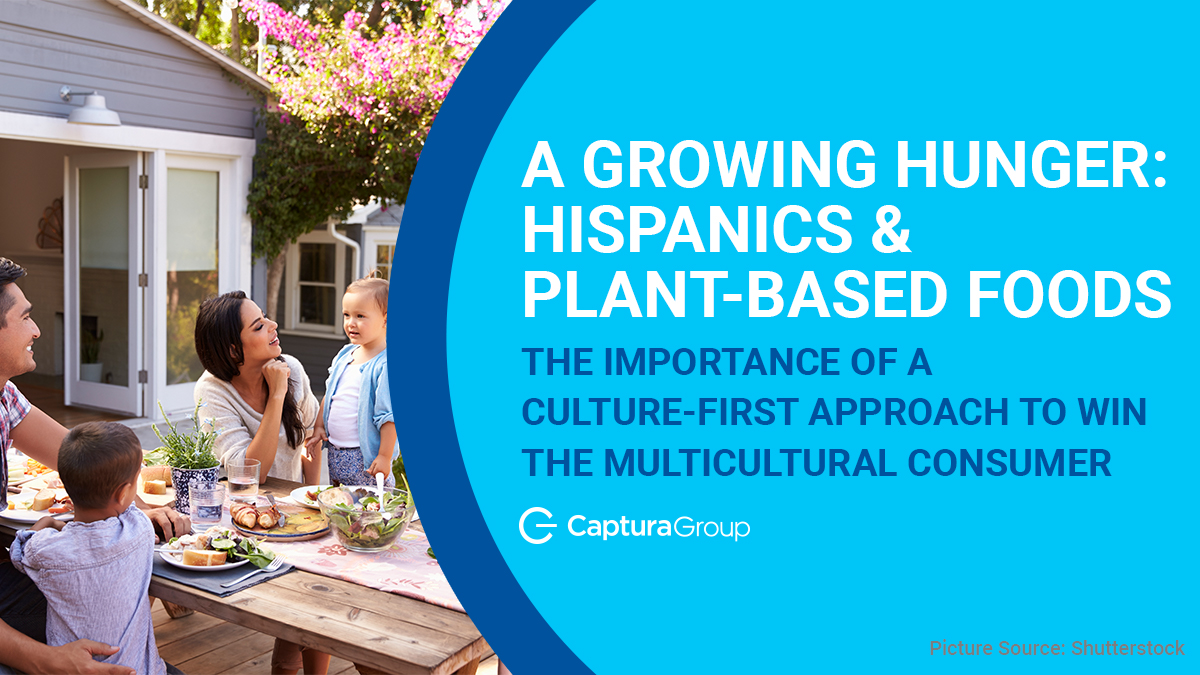A Growing Hunger: Hispanics & Plant-Based Foods

The Importance of a Culture-First Approach to Win the Multicultural Consumer.
Food plays a defining role in multicultural consumers’ lives, and research shows that adopting a flexitarian lifestyle has become much more than a passing fad, especially for diverse communities in the United States. Recent statistics from Danone suggest an increasing demand for plant-based foods, particularly among U.S. Black, Asian American and Hispanic consumers.
While many may not have fully committed to a plant-based diet yet, well more than half of Hispanics (61% vs. 49% of the general market) are open to substituting current foods and beverages with plant-based alternatives. Adoption of plant-based foods is particularly strong among younger generations with 45% of multicultural millennials and Gen-Z having added plant-based foods to their diet.
Diverse market’s openness to substitute current foods with plant-based alternatives
Culture, values and perceptions play a fundamental role in understanding the growth of this bustling market, particularly for Latinxs: 82% of Hispanic consumers feel food is a form of self-expression and 83% express a desire to make environmentally friendly food choices. Given these numbers, and considering the commonplace use of grains and vegetables in traditional Latin American diets, a plant-based diet is appetizing for many U.S. Hispanics.
Barriers for Multicultural Consumers
Despite these growing numbers, in many cases, a willingness to try plant-based foods is not enough to drive actual consumption, and most of the barriers may stem from the industry’s inability to understand the consumer’s reality and leverage actionable cultural insights. Some of the challenges expressed by multicultural consumers when it comes to plant-based foods include:
- Underrepresentation: From marketing to innovation and product design, diverse consumers feel less represented and less engaged by plant-based food brands.
- Cultural Stigma: More than half of Hispanic and African Americans “strongly” or “somewhat agree” there is stigma in their culture around people who eat plant-based foods.
- Cost and availability: Multicultural consumers feel healthier or more nutritious foods are less attainable due to barriers of affordability and accessibility.
If brands wish to engage with their diverse consumers in a deeper and more meaningful way, marketing efforts need to better reflect this audience’s culture and lifestyle. Understanding the consumer’s core values and context is bound to inspire more authentic connections that truly impact a brand’s bottom line.
Winning the Hispanic Consumer
While invaluable as strategic starting points, cultural insights alone are not enough to drive market growth with Hispanic consumers. A culture-first approach that can translate strategic direction into effective tactics that authentically connect and engage with this audience requires:
- A thorough assessment of the Hispanic plant-based opportunity and a prioritization of brands for Hispanic investment
- Deep market research on Hispanic consumers to understand challenges, and opportunities within different subsets of this diverse audience.
- Allocation of appropriate budget to prioritized brands and establish goals and corresponding KPI’s
- Ensuring that strategic plans address key barriers for Hispanic consumers and effective ways to overcome them
| Barrier | Strategic Thought Starter |
| Underrepresentation of Hispanics: | * Leverage culture-first approach to authentically represent the Hispanic target * Base messaging on a deep understanding of Hispanic insights * Consider in-language, in-culture approach and cast Hispanic talent for creative executions including packaging, point-of-sale and media |
| Cultural Stigma: | * Embrace stigma, understand its cultural sources, and address it * Leverage the relevance of vegetables and grains in traditional Latin American cuisine to create an appealing and culturally relevant way in for plant-based food products. * Partner with relevant Hispanic influencers to de-stigmatize plant-based foods |
| Affordability and Accessibility: | * Partner with charitable / community engagement to educate lower-income consumers on the benefits of plant-based diets * Leverage loyalty program to offer discounts * Partner with relevant retailers to increase access and affordability |
When it comes to booming markets such as Plant-based Food and Beverages, experience and familiarity with its burgeoning diverse segments can make or break a strategic marketing approach. Choosing the right partner with the skills and experience to engage a new, multicultural customer base will be critical to maximizing growth opportunities.
Captura Group is a Hispanic and digital-first full-service agency obsessed with helping brands succeed in a multicultural world. We leverage the power of digital innovation and cultural intelligence to accelerate growth for our clients.
Source: Danone North America (Dec 08, 2021)
